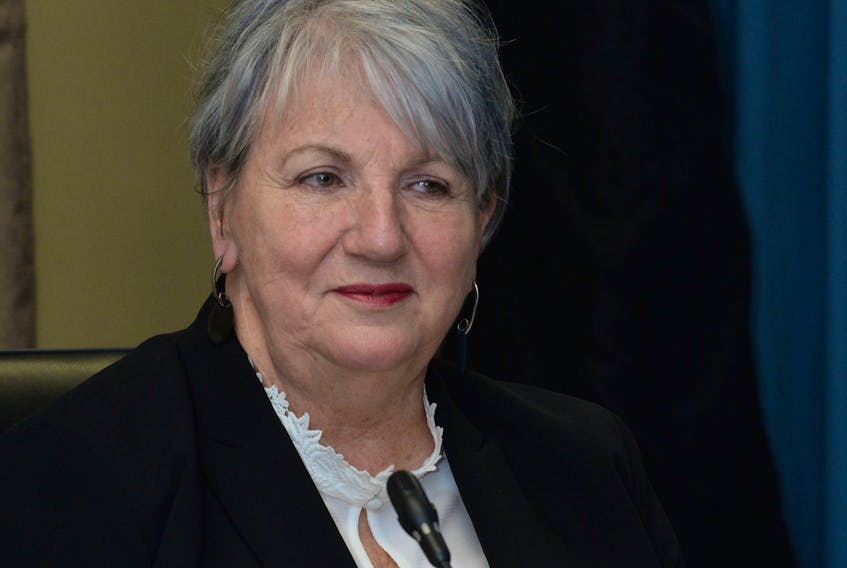At the Muskrat Falls Inquiry, former premier Kathy Dunderdale has been questioned about the possible alternatives to the hydroelectric megaproject her government sanctioned in 2012. One alternative was to purchase and import power from Hydro-Québec.
She testified it wasn’t likely to happen on her watch.
Auditors from Grant Thornton have previously told the inquiry there was no evidence of a serious attempt at negotiating with Quebec and Hydro-Québec for domestic power, before the idea was dismissed by the Government of Newfoundland and Labrador, and Crown corporation Nalcor Energy was green-lit on the Muskrat Falls project at the end of 2012.
Former Nalcor Energy president and CEO Ed Martin has testified the understanding was Quebec and Hydro-Québec were not in a position to provide the province with firm, reliable power at the time of the intense debate around Newfoundland and Labrador’s options in 2010-12. That’s in addition to political considerations.
Whether or not the power could have been provided is less an issue now, since Dunderdale has testified repeatedly she would not have wanted a deal with Quebec at the time, even if supply was available.
“If it had come forward as a proposal, I don’t think that it would have proceeded very far because there would have been another overlay then from government on the political side,” she said.
She has spoken about a soured political relationship and suggested she didn’t like the idea of being beholden to Quebec. She preferred energy independence.
“I personally would have had the greatest difficulty — as would others in our government — in putting all of our reliability on Hydro-Québec to provide service to the people of the province under any circumstance given some of their actions. Completely outside of anything to do with the Upper Churchill."
— Kathy Dunderdale
The “Upper Churchill” is the Churchill Falls Hydroelectric Generating Station in Labrador, upriver from Muskrat Falls, and owned by the Churchill Falls (Labrador) Corp. (CFLCo). It is a joint venture of Hydro-Québec and Newfoundland and Labrador Hydro, a Nalcor Energy subsidiary. The provincial government has been fighting for decades with Quebec over the benefits flowing from the 5,428-megawatt asset, seeking a greater share of the returns, most recently failing in arguments to the Supreme Court of Canada.
During her first three days on the stand, Dunderdale shared generally negative opinions of Quebec and Hydro-Québec (neither are represented at the inquiry). Apart from the Churchill Falls contract being challenged in the courts again during her tenure, she highlighted attempts by the province to secure transmission rights through Quebec, to no avail.
The inquiry has heard conflicting testimony on the attempt, with the suggestion Nalcor Energy and Newfoundland and Labrador did not aggressively pursue their case and file evidence to deadline. Muskrat Falls Inquiry Commissioner Richard LeBlanc has indicated he has looked closely at the case, as he works to determine if the province’s steps on Muskrat Falls were appropriate.
Dunderdale said she didn’t like “what happened with them in terms of New Brunswick,” apparently referring to the attempt by Hydro-Québec to purchase NB Power transmission assets, giving Hydro-Québec control of the routes for electricity out of Atlantic Canada. Then-premier Danny Williams issued strong, public objections (Dunderdale was a cabinet minister at the time). The deal eventually fell through.
She noted Hydro-Québec tried to become involved in the Lower Churchill Project environmental review (including the development at Muskrat Falls). She did not mention Newfoundland and Labrador interjected in the environmental review on Hydro-Québec’s La Romaine developments.
She pointed to a campaign by representatives for Quebec against the federal loan guarantee. That campaign ramped up when Newfoundland and Labrador went back for a second loan guarantee, as it attempted to tackle cost overruns on Muskrat Falls. The Parti Québecois challenged the federal government in the House of Commons and labelled the deals a “cheat” of Quebec, calling for protection for Hydro-Québec.

But in 2011, as Dunderdale testified, leading into the sanctioning decision on Muskrat Falls, there was a possible alternative future that could have been set. Dunderdale said Quebec premier Jean Charest (ousted in 2012) approached her with a pitch: get the federal government to inject $3 billion in Quebec’s energy infrastructure and, in return, Quebec would grant a corridor from Labrador to Ontario for power from the Churchill River. There could then be a power purchase agreement undertaken with Ontario. She said the idea would then be to develop both the hydroelectric prospect at Gull Island and the power station at Muskrat Falls.
Dunderdale made no comment on the fact the proposal would not, on its face, have served the stated domestic need for power on the island of Newfoundland.
But she said Charest committed to speaking to Ontario premier Dalton McGuinty about the proposal and making their collective pitch to then-prime minister Stephen Harper.
“And he and premier McGuinty and I met and discussed it, and it was decided at that meeting that Charest would make the pitch to prime minister Harper. And prime minister Harper wasn’t going to have anything to do with it whatsoever and the thing fell apart,” she said. “And I’ve thought about it often, because while prime minister Harper may not have considered it, I have a funny feeling that perhaps (subsequent) Prime Minister (Justin) Trudeau might have.”
She said there were talks later with Charest successor Pauline Marois, but to no tangible result.
In November 2012, Dunderdale publicly commented on Ontario being “very interested” in a development at Gull Island. It was still before the Muskrat Falls project was sanctioned. Ontario's Ministry of Energy confirmed meetings with Nalcor Energy and generally supported continued discussion between the Ontario Power Authority and Nalcor. But that’s as far as it went.
Meanwhile, in a speech to the St. John’s Board of Trade in October 2012, Dunderdale talked about getting rid of "Quebec's predatory grip on our province's economy," and said the Muskrat Falls project is the least-cost option for reliable power for Newfoundland and Labrador.
She continues on the stand at the Muskrat Falls Inquiry Thursday.
Related stories:









